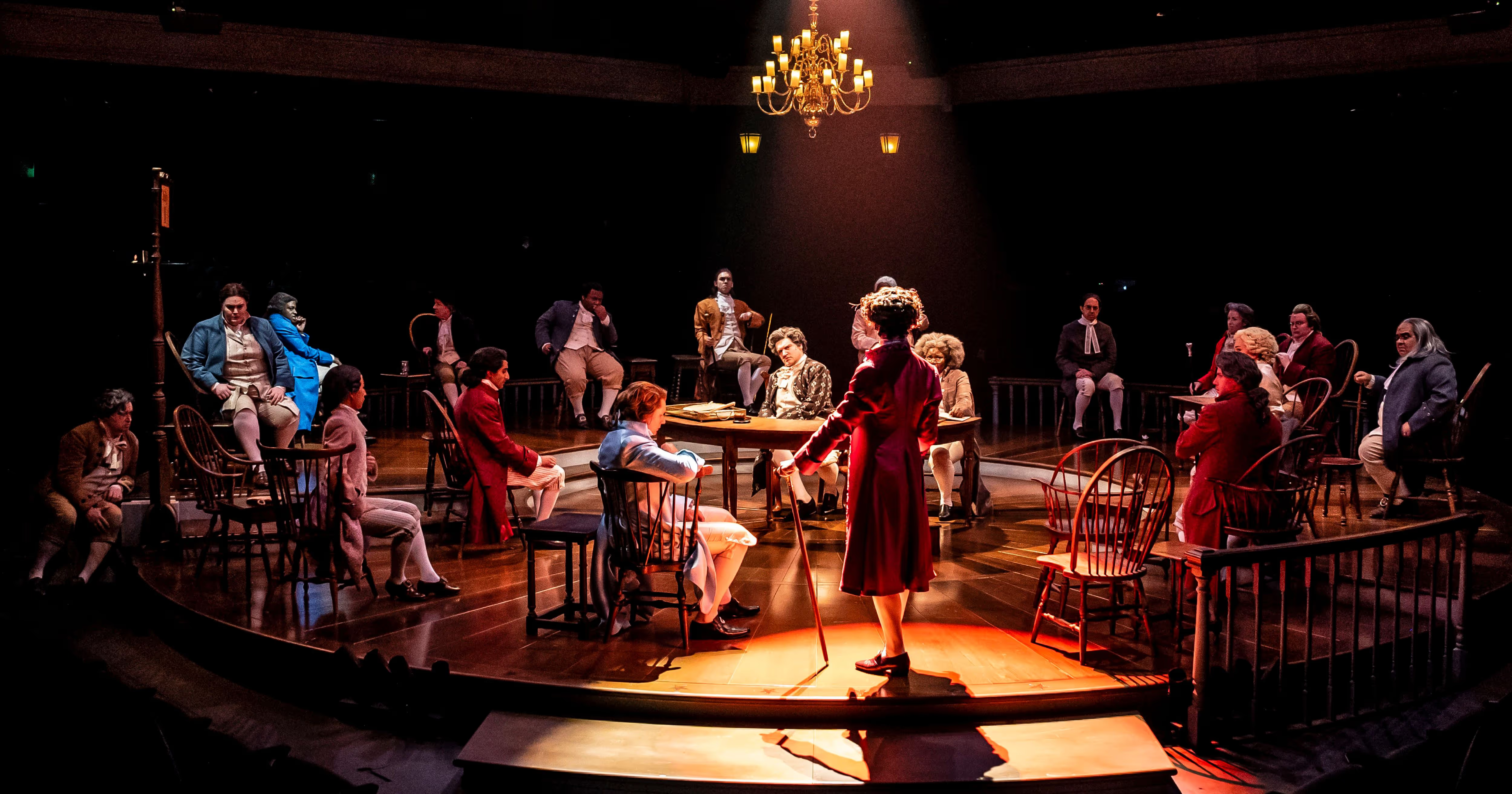Ring the Bell for 1776 at Marriott Lincolnshire Theatre
The musical 1776 debuted on Broadway in 1969 in anticipation of our country’s bicentennial. This tuneful reimagining of the struggle to give birth to our nation, with a fine book by Peter Stone, and a memorable score by Sherman Edwards, never grows old for me. With so much at stake for our country again in this election year, an outstanding new production by the Marriott Theater, just northwest of Chicago in nearby Lincolnshire, Illinois, is perfectly timed to remind us that the fight for freedom and justice is never over.
In 2022, in an attempt to make it more specific to our times, director Diane Paulus staged a very Brechtian, all female production on Broadway, which eschewed the normal verisimilitude of privileged white men in tights. It put the marginalized communities of women, LGBTQ, and racial minorities in these roles in their place instead. I didn’t have the opportunity to see that production in full. But the excerpts I have seen stretched my willing suspension of disbelief a bit too far, and distorted the play too much for my taste.
Nick Bowling, one of Chicago’s best directors of thoughtful plays, has assembled a more balanced, gender bending production of 1776 at the Marriott, which effectively blurs the lines between the sexes and races in a way that is illuminating without ever being distracting or self-conscious. Several of the male roles are played by women. But their sex is kept appropriately in the backs of our minds by unifying details of costumes, wigs and period styled performances which blend the genders. Another wise choice was to cast shorter male leads who match the stature of the women, rather than tower over them, which also helped to blur the sexual distinctions. This choices make sure that the production concept always remains in support of the play, rather than overshadowing it.
Taking a cue as well from the trail blazed by Hamilton, color blind casting lets this company evoke the racial composition of America today, as well as its current Congress. In particular, casting a black actor, Tyrick Wiltez Jones, as John Adams, the leader of the revolutionary movement, makes his impassioned argument against allowing slavery to continue in our nascent republic even more emotionally powerful.
The story of “1776” revolves around the efforts of the pro-revolutionists to achieve the unanimous vote required to declare our independence from England. They are opposed by the wealthy Southern conservatives, who are determined to preserve the institution of slavery, which supports their economy at any social cost. It isn’t a heritage that the right wing likes to be reminded of in public.
In fact, when 1776 was made into a movie in 1972, then president Richard M. Nixon, who had seen the stage play in 1970 at a special White House performance, pressured producer Jack L. Warner to cut the musical number “Cool, Considerate Men,” in which the right wingers gloat about their politics, so they wouldn’t look so bad. He did. Fortunately, the editor preserved the negative, and the number was put back for the DVD director’s cut in 2002 Given the behavior of the Republican representatives in our current Congress, it was chillingly appropriate to see that number onstage again.
John Adams is an irritating thorn in the side of the Continental Congress, pushing for a vote on independence. They sing “Sit Down, John” to silence him…but to no avail.
Fighting by Adam’s side is wise and witty Benjamin Franklin, played to perfection by Richard R. Henry. They enlist the help of Virginian Richard Henry Lee, played by the delightful Lucy Godinez, hoping to get a Southern state to propose independence. Then, they get Thomas Jefferson, embodied with subtle charm and conviction by Erik Hellman, to write the Declaration of Independence.
In order to get lovesick Jefferson’s mind back on the writing of the Declaration, they arrange a conjugal visit by his wife, Martha. The show’s most lovely song, “He Plays the Violin”, about her love for Jefferson, was beautifully sung by soprano Alicia Kaori in her Marriott debut.
Adams, too, longs for his wife, who is home with the kids and the measles. Katherine Alexis Thomas as Abigail Adams was not only a thrilling singer, but also an irresistibly delightful personality. By not tinkering with the sexes of these two couples, Bowling has allowed their love stories to be enjoyed as they were intended to be.
However, there are a number of powerful women in supporting male roles in this production who can rattle sabers with the best of them. Shining brightest among the male identifying ladies of the cast is Marriott veteran and multiple acting award winner Heidi Kettenring as the right wing leader, John Dickinson. Her forceful, witty, and razor sharp delivery make her a formidable challenger to Adams.
It’s hard to give a shout out to every one of the outstanding actors in this large ensemble. But more kudos go to Joel Gelman as an affable John Hancock, who holds together both the Congress and the audience with his wit and warmth. Karl Hamilton as the overworked congressional custodian provides more comic relief. Nancy Voigts as elderly Caesar Rodney shows that crotchiness transcends sexuality. Ed Kross as the reverend John Witherspoon made me smile with his naiivete. In a smaller but pivotal role, I particularly enjoyed Teddy Gales as James Wilson, the quiet man who ends up tilting the tables of history with his desire to remain forgotten.
As the hapless messenger who brings George Washington’s increasingly pessimistic dispatches to the Congress, Jay Westbook sang a hauntingly sad and beautiful version of “Momma, Look Sharp”. In a lovely directorial choice, Gabrielle Lott-Rogers as the Congressional Secretary, Charles Thomson, sang with him as the spirit of the dying boy’s mother in the bridge of the song. It was a wonderful and unexpected musical moment, which only a gender blended production like this one could provide.
Another actor in this company who is destined for national attention is Matthew Hommel as Edward Rutledge of South Carolina, the youngest member of Congress, and staunch champion of slavery. This brilliant young performer making his Marriott debut, gives a vocally thrilling and emotionally searing rendition of the song “Molasses To Rum,” which mocks the North for its hypocrisy in profiting privately from the very slave trade they deride publicly. It was quite simply the best performance of this very demanding, tour de force song I’ve ever heard.
...
The small but mighty Marriott band was crisply conducted by Music Director and Orchestrator Ryan T. Nelson.
The choreography by Tanji Harper was just enough blend of period style and motivated movement, as needed.
The production design is replete with details that pull us into the experience. Set designer Regina Garcia uses period furniture to its best advantage. The fine costumes by Theresa Ham, include a witty color choice, pitting a red robed John Dickenson against a blue coated John Adams. The wigs by Miguel A. Armstrong are picture perfect. The lighting by Jesse Klug has a warmth that evokes an eighteenth century painting. Michael Daly’s sound design was a notch above the last show I saw at Marriott. While not technically part of the production design team, special praise is also due to photographer Joe Mazza of Brave Lux for his stunning preproduction photos of the cast in costume, which transported us back in time so perfectly that they made me feel I had to go see this production (as should you.)
One tiny detail of staging which I appreciated very much comes at the very end of the show. In a proscenium theater, it’s easy enough to end the show with actors recreating the famous painting of the signing of the Declaration of Independence in a final tableau. This being a theater in the round, however, it took some more invention to create that moment. In this production, several actors very slowly and deliberately turn their heads as they take their places around the stage at the end. It’s such a simple physical gesture; and yet, suddenly, all our eyes are drawn to those proud and determined faces, frozen for a moment in time, as the liberty bell rings out. That’s the kind of attention to detail which makes this production so glorious overall.











